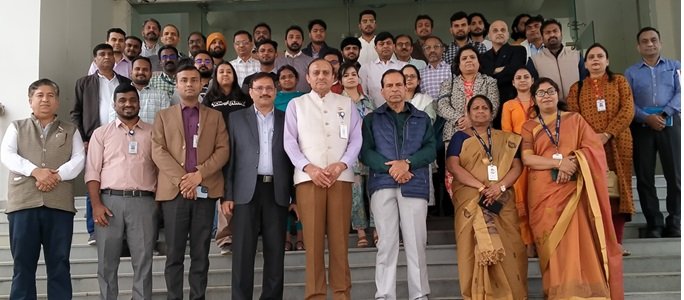The Indian National Space Promotion and Authorization Centre (IN-SPACe) has organised an innovative ‘Train the Trainers’ short-term program in the use of space technologies in the agriculture sector. The 5-day course on ‘Using Space Technology for the Agriculture Sector’ has been designed in collaboration with the Indian Space Research Organisation (ISRO), Meerut Institute of Technology (MIT), various Non-Government Entities (NGEs), and academia.
Dr Vinod Kumar, Director, Promotion Directorate, IN-SPACe said, “The new course is an important step towards realizing the transformative potential of space technology in boosting the agriculture sector. It aims to equip individuals with both theoretical and practical knowledge of space technologies in the agriculture sector. This initiative aligns with the broader goal of benefiting the common man, embodying the spirit of (Antyodaya) as well as our commitment to using advanced technology for the betterment of its agricultural practices and ultimately, for ensuring food security and sustainability”
The Short-Term course on Using Space Technology for the Agriculture sector covers a comprehensive curriculum designed to leverage space technology in agricultural practices. The use of space technology can revolutionise precision farming and leverage satellite data and space-based assets to empower farmers with the power of information to optimize their agricultural practices with unprecedented precision. By analysis of climate data and weather forecasting, it will help to safeguard crops against unpredictable weather patterns.
The course includes modules on Agriculture Land Monitoring, Pest/Disease Detection & Incidence Forecast, Crop Area Estimation & Production Forecast, Cropping Systems Analysis, Soil Mapping & Monitoring, and Agriculture Drought Assessment & Monitoring. Additionally, there are sessions on Horticulture Crop Area Estimation & Monitoring and Command Area & Water Resource Monitoring.
The course also examines topics such as the study of plant nutrient deficiency symptoms, advances in sensing and analytics for precision agriculture, and the fundamental applications of phytotron technology. There’s a focus on the practical aspects of agriculture, including soil sampling, soil processing, drone and robot demonstrations, and methods of soil analysis. Other practical aspects include preparation of growing media, testing of seed germination, measurement and handling of humidity, and the qualitative and quantitative exposure of light.
The course highlights the use of space technology applications in the agricultural sector, introducing participants to the basics of Remote Sensing, Geographic Information Systems (GIS), and Remote Sensing applications in agriculture. Sessions on Crop Inventory and Health using optical methods, Earth Observation (EO) based Digital Agriculture and Global crop monitoring systems, and microwave remote sensing for crop inventory with hands-on training round off the course. Participants are also introduced to various ISRO portals like Bhoonidhi, BHUVAN, VEDAS, and MOSDAC, integrating space technology with AI and ML for comprehensive farm management.








